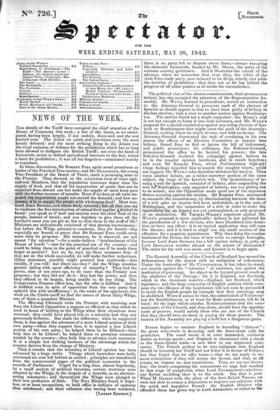The political vice of the chosen constituencies, their proneness to
bribery, has also occupied the attention of the Representative As- sembly. Mr. WYNN learned in precedents, moved an instruction to the Attorney-General to prosecute such of the electors of Ipswich as should appear to him to have been guilty of bribery at the last election ; with a view to another motion against Southainp- ton. The motion found not a single supporter: the House's zeal is not hot enough to hurry it into rash measures, and Mr. WYNN'S proposal for a special commission against any erring electors of Ips- wich or Southampton that might cross the path of the Attorney- General, seeking whom he might devour, met with no favour. The Attorney-General deprecated the task of combining in his own person the offices of an Election Committee to inquire into bribery, Grand Jury to find or ignore the bill of indictment, and public prosecutor ; his colleague, the Solicitor-General, pronounced the office to be beyond his powers ; the late Solicitor General declared the campaign against bribers to be in the popular opinion invidious, and in result hopeless ; and even Sir ROBERT PEEL, whose Parliamentary high-pri- vilege feelings impelled him to punish the naughty voters, could not support Mr. WYNN—who therefore withdrew his motion. Then came another debate, on a rather narrower portion of the same subject, the issue of the Ipswich writ. The inconsistency of is- suing a writ for Ipswich, convicted of bribery, after suspending the writ fo? Nottingham, only suspected of bribery, was too glaring not to be seized; and the Opposition made good use of the argument thence accruing against the motion. Sir ROBERT PEEL attempted. to reconcile the inconsistency, by discriminating between the issue of a writ oiler an inquiry had been undertaken, as in the case of Nottingham, and the suspension of a writ in order to make the opportunity for an inquiry not yet contemplated, or only proposed as an obstruction. Sir Tomas Wilms's argument against Mr. WYNN'S proposal is more applicable : bribery is too universal for the punishment of a few electors, who have blundered into detec- tion, to have any effect : it is no topical application that will cure the disease; and it is hard to single out any small section of the offenders for a nugatory punishment. Why then delay the routine business of the House, the issue of new writs to corrupt boroughs, because Lord Joins RUSSELL has a bill against bribery in petto, or Lord BROUGHAM another abroad on the waters of discussion? The order for the writ was made, and Ipswich is to begin again.


























